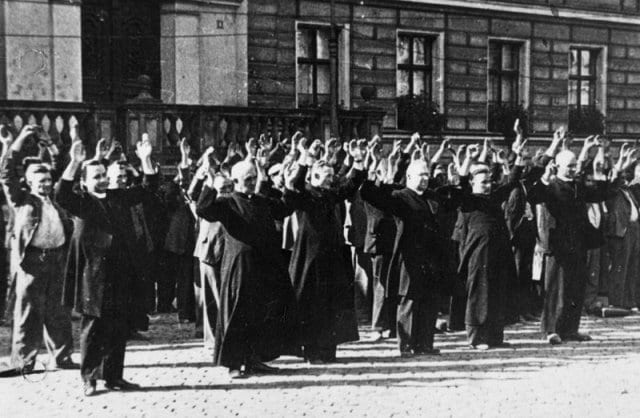I keep hearing Christianity being blamed for Nazism. Specifically, I keep hearing about Lutheranism being blamed for Nazism. It is true that the German state churches were taken over by the Nazis and that many members of those churches were enthusiastic supporters of Hitler.
But the theology of the Nazified churches grew out of liberal theology, including higher Biblical criticism. This strain of religion was so anti-Bible, so culture-conforming, so anti-Christ, and so anti-salvation that there is no way that it can be classified as Christian. And it was certainly anti-Lutheran, making a point of repudiating everything that Lutherans believe, teach, and confess.
I have written about this in my book Modern Fascism. But I came across an article about the theology of the “German Christian Movement” on Wikipedia that makes the point in a way that cannot be refuted.
They called it Positive Christianity (my bolds):
Positive Christianity (German: Positives Christentum) was a movement within Nazi Germany which mixed the belief that the racial purity of the German people should be maintained by mixing Nazi ideology with elements of Christianity. Adolf Hitler used the term in article 24[a] of the 1920 Nazi Party Platform, stating: “the Party represents the standpoint of Positive Christianity”. Nondenominational, the term could be variously interpreted. The Nazi movement had been hostile to Germany’s established churches. The new Nazi idea of Positive Christianity allayed the fears of Germany’s Christian majority by implying that the Nazi movement was not anti-Christian.[2] That said, in 1937, Hans Kerrl, the Nazi Minister for Church Affairs, explained that “Positive Christianity” was not “dependent upon the Apostle’s Creed“, nor was it dependent on “faith in Christ as the son of God“, upon which Christianity relied, rather, it was represented by the Nazi Party: “The Führer is the herald of a new revelation”, he said.[3] To accord with Nazi antisemitism, positive Christianity advocates also sought to deny the Semitic origins of Christ and the Bible. Based on such elements, positive Christianity separated itself from Nicene Christianity and as a result, it is considered apostate by all historically Trinitarian Christian churches, regardless of whether they are Catholic, Eastern Orthodox, or Protestant. . . .
Theological and doctrinal aspects
Adherents of positive Christianity argued that traditional Christianity emphasized the passive rather than the active aspects of Christ’s life, stressing his miraculous birth, his suffering, his sacrifice on the cross and other-worldly redemption. They wanted to replace this doctrine with a “positive” emphasis on Christ as an active preacher, organizer and fighter who opposed the institutionalized Judaism of his day. At various points in the Nazi regime, attempts were made to replace conventional Christianity with its “positive” alternative.
Positive Christianity differed from mainstream Christianity in that positive Christianity:
- Rejected the Jewish-written parts of the Bible (including the entire Old Testament)
- Claimed “Aryanhood” and non-Jewishness for Christ
- Promoted the political objective of national unity, to overcome confessional differences, to eliminate Catholicism, and unite Protestantism into a single unitary positive Christian church[10]
- Also encouraged followers to support the creation of an Aryan Homeland
Origins of the idea
Steigmann-Gall traces the origins of positive Christianity to higher criticism of the nineteenth century, with its emphasis on the distinction between the historical Jesus, and the divine Jesus of theology.[11] According to some schools of thought, the saviour-figure of orthodox Christianity was very different from the historical Galilean preacher. While many such scholars sought to place Jesus in the context of ancient Judaism, some writers reconstructed a historical Jesus who corresponded to racialist and antisemitic ideology. In the writings of such antisemites as Emile Burnouf, Houston Stewart Chamberlain, and Paul de Lagarde, Jesus was redefined as an Aryan hero who struggled against Jews and Judaism. Consistent with their origins in higher criticism, such writers often either rejected or minimized the miraculous aspects of Gospel narratives, reducing the crucifixion to a tragic coda to Jesus’s life rather than its prefigured culmination. Both Burnouf and Chamberlain argued that the population of Galilee was racially distinct from that of Judea. Lagarde insisted that German Christianity must become “national” in character.
Photo: The public execution of Polish Catholics by Unknown author – Włodzimierz Jastrzębski, Jan Szyling, „Okupacja hitlerowska na Pomorzu Gdańskim w latach 1939-1945”, Wydawnictwo Morskie, Gdańsk 1979, Public Domain, https://commons.wikimedia.org/w/index.php?curid=16143317 via Wikimedia Commons













